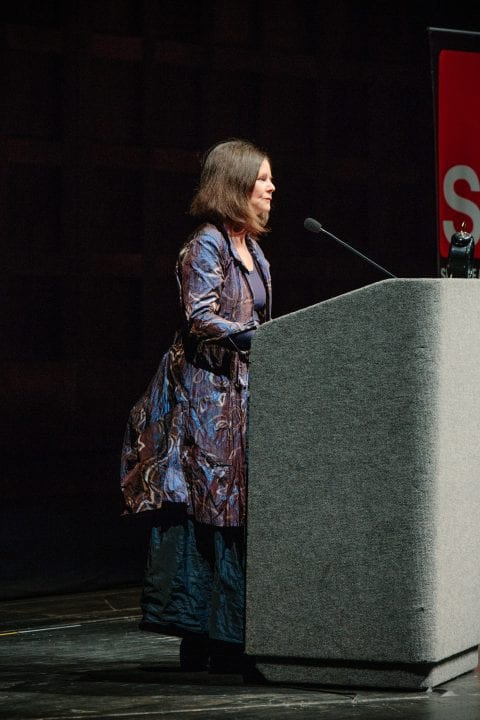
A Fashionable Literary Evening with Geraldine Brooks
February 8, 2016
By Christina Gould, Patron Services Manager
As a SAL staff member, I usually have the privilege of catching a glance at the celebrated author prior to opening the house for our events—the moment when my expectations based on the things I have read and the reality of the person being here, in the flesh, come together. But, because McCaw Hall’s box office is tucked under the stairs, my first glimpse of Geraldine Brooks happened alongside the rest of the audience, when she walked on stage. Caught in the moment, without my usual preview, I could not contain myself, whispering to my friend, “I love her outfit!” While my longtime appreciation of Brooks’ writing prepared me to be taken by her words, I must digress for a bit to mull over her metallic coat and skirt ensemble– I found it elegant yet functional, both modern and European, colorful but subtle, feminine and practical, all of which turned out to be an apt description of both the author and the evening.
Brooks, a petite woman with an infectious laugh, immediately established chemistry with the near-capacity crowd by saying she normally travels around to bookstores whose audiences average five people and one dog, making her profoundly grateful and scared to be in front of all of us. She brought us into her writing process by speaking on her collection of unhelpful signage and her special affinity for signs that make her laugh. The prize of her collection reads, “For your safety, please exit the freight deck while the vessel is under way.” She loves signs that remind her of how magnificently complicated our language is, how hard it is to convey exact meaning, and how careful we need to be of its frailty. As a historical fiction writer, she must be accurate with words. When writing The Secret Chord, she had to remove the word “assassin” because it did not exist in the time of the book’s setting. Her attention to detail bears the question: does it matter? Her answer? Out of respect for the reader, yes, it does.
Sprinkled throughout Brooks’ talk were stories of her life experiences as an Australian, a journalist, a “mum” (as she would say), a fiction writer and a citizen of the world. The stories were humorous, humbling, matter of fact and filled with integrity.
She also doesn’t believe in writer’s block; you get up and you go to work, a useful approach as a journalist, where you file the story or you fail. As a foreign correspondent, she entered people’s lives at the worst of times, but she always knew it was in the interest of creating something worthwhile. After a harrowing experience in a Nigerian jail, she quit journalism for fiction. Journalism is here and now; fiction is forever.
As a fiction writer, she tries to use her experiences to make the suffering she witnessed around the world count for something. Fiction matters and has power. This she knows first-hand. From jailers to despots, those in power are afraid of it, which only encourages her to try harder. Fiction gives the writer an opportunity to demonstrate our responsibilities towards each other, to create fantastic societies where we recognize each other’s differences. What unites us is greater than what divides us. She referenced her novel, People of the Book, where Muslims, Catholics and Jews risked their lives to rescue the famed Sarajevo Haggadah.
Brooks’ talk was resplendent with jeweled stories that sparkled with brilliance and hopefulness. One of my favorite quotes of the evening was, “Behind every beginning is another beginning. No matter how long ago, every generation has a once upon a time.” It was an evening of inspiration, learning and, I must admit, yearning. l wish I had access to her exquisite processes and experiences—not to mention, her exquisite designer. But, I digress.